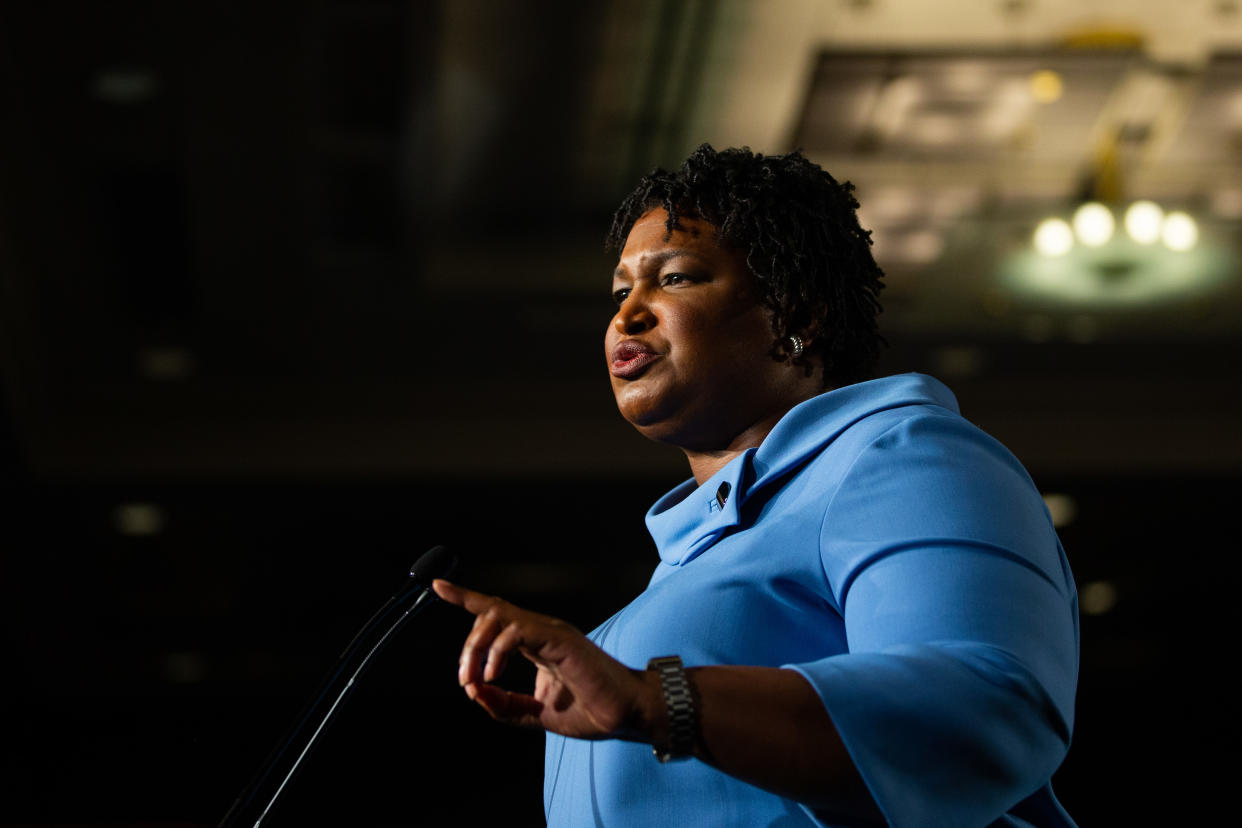House panel travels to Atlanta to hear from Stacey Abrams on voting rights

A group of House Democrats will travel to Atlanta Tuesday to hold the second in a series of hearings around the country aimed at making the case for a restoration of the Voting Rights Act, which was weakened in a 2013 Supreme Court decision.
Rep. Marcia Fudge, D-Ohio, will chair a field hearing of the House Administration Committee’s elections subcommittee, which will feature testimony from Stacey Abrams, the Georgia Democrat who narrowly lost the state’s gubernatorial race last fall in an election marred by irregularities and widespread questions about tactics used by the winner, Republican Brian Kemp.
Kemp was Georgia’s secretary of state from 2010 until a few days after the 2018 election and thus oversaw the election while also running as the Republican candidate for governor.
And Kemp’s tenure as secretary of state was defined by a multitude of complaints that he consistently sought to make it harder for African-Americans in Georgia to vote. During the 2018 elections, Abrams called Kemp the “architect of voter suppression.”
Kemp defeated Abrams by 55,000 votes out of 3.9 million cast. Abrams never actually conceded the race, but indicated she would not challenge it in court. She has since founded a group that filed a lawsuit claiming that Kemp, as secretary of state, erected an “obstacle course” to voting that mostly affected African-Americans and the poor.
Abrams’s national profile has been elevated as a result of the 2018 election, and last Friday she said she will use her platform to push voting rights and the issue of voter suppression into a more prominent place in the political conversation.
“Voter suppression … has to be considered the crisis of our day,” Abrams said. “We have to talk more about it. We have to make this a larger conversation.”

Fudge’s elections subcommittee was recently reinstated by House Speaker Nancy Pelosi after Republicans disbanded it in 2013, the same year that the Supreme Court weakened the Voting Rights Act of 1965 in a 5-4 decision in Shelby County v. Holder. That decision held that formulas used by the Justice Department to determine which states had to submit plans for changes to voting laws were outdated. Chief Justice John Roberts essentially concluded that systematic discrimination was not the pervasive problem it once was. The four dissenting justices wrote that the Voting Rights Act was the only reason discriminatory laws had not been enacted.
Since 2013, voting rights advocates point to a rash of activity by largely Republican states to enact voter ID laws, to close polling places and to purge voter rolls as evidence that the VRA is once again needed. And Georgia’s 2018 election under Kemp is one of their chief exhibits for this.
A release by the elections subcommittee prior to announcing the Atlanta field hearing cited a long list of examples: Kemp purged 1.5 million voters from the rolls between 2012 and 2016, and he utilized an “exact match” system that flagged voter registrations for minor discrepancies, which disproportionately affected African-American voters. Kemp also closed 214 polling places between 2012 and the present.
“We still need [the VRA’s] protections,” Fudge said at the elections subcommittee’s first hearing, on Feb. 4 in Brownsville, Texas. The Shelby decision, Fudge said, “enabled bad actors to deny Americans their fundamental tights, and they allowed elected officials to pick their votes.”
Fudge vowed that “the record we compile … will prove beyond a shadow of a doubt that we still need the Voting Rights Act.”
Pelosi last fall said she would reinstate the elections subcommittee and name Fudge the chair, at the same time that Fudge, a former chair of the Congressional Black Caucus, withdrew her name from the list of Democrats thinking of challenging Pelosi for the speakership.
The only Republican on the three-member elections subcommittee, Rep. Rodney Davis of Illinois, did not attend the Brownsville hearing and was not scheduled to attend the Atlanta hearing either. In a statement, Davis said, “I believe, along with Congresswoman Fudge, that we need to listen to all that is being said during these sessions and the upcoming field hearings to determine what election reforms will be the most effective going forward.”
In addition to Abrams, the panel on Tuesday will hear testimony from Sean J. Young, legal director of the Georgia ACLU; Cliff Albright, co-founder of Black Voters Matter; Stacey Hopkins, a Fulton County voter; and Gilda Daniels, director of litigation for the Advancement Project.
_____
Read more from Yahoo News:
Ann Coulter: ‘Lunatic’ Trump could be challenged in 2020 — from the right
As Trump administration negotiates with Taliban, some retired U.S. generals see defeat
Crackdown on opioids has its own victims: People who need them to live
As 5G war with China heats up, could a Cold War-inspired plan be the solution?


